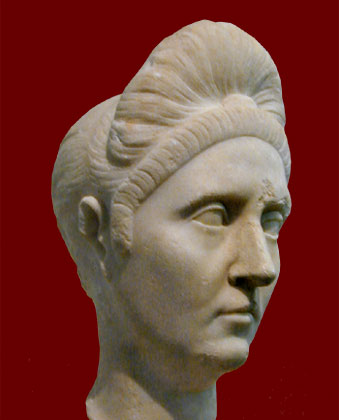 Marble head (c. 98-117 CE) of the Empress Plotina |
When Plotina entered the palace after the ceremonies installing Trajan as emperor, she is reported to have promised the Romans that she would remain always the way she was at that moment. As empress, Plotina was greatly interested in the welfare of the Roman people and used her influence to promote greater equity of taxes and to provide assistance to orphans and the poor. She was born Pompeia Plotina Claudia Phoebe Piso in Nemausus (Nîmes), Gaul, during the reign of Nero (54-68 CE). Married to Trajan before he became emperor, she gained respect for the simplicity, virtue, dignity, and love of philosophy she brought to the imperial house; her images portray a serious woman of traditional mores. Happily married, Plotina and Trajan had no children; they adopted the young Hadrian, Trajan's distant relative. In 105 CE, Plotina accepted the title Augusta, having refused it when it was offered in 100 CE; the title was first bestowed on Livia by Augustus in his will (14 CE) in recognition of her virtues. From 112 CE Plotina appears on coins issued by Trajan (see bronze sestertius) and after his death by Hadrian (see aureus), in honor of the purity of her family life. At her death in121/2 CE, the Senate voted to deify her, commemorating her with temples. In this excerpt from Pliny's Panegyricus, a speech of thanksgiving to the Emperor Trajan, his only surviving speech, delivered in the Senate when he was consul in 100 CE (see his life and this site), Plotina is commended as a wife who complements her husband in both behavior and character (see this jugate cameo portrait, c. 105-115 CE). For further information on the Trajanic women, see Boatwright, Roche in the Bibliography. |
| Multis illustribus dedecori fuit aut inconsultius uxor assumpta aut retenta patientius; ita foris claros domestica destruebat infamia, et ne maximi cives haberentur, hoc efficiebatur, quod mariti minores erant. | |
| Tibi uxor in decus et gloriam cedit. Quid enim illa sanctius, quid antiquius? Nonne, si pontifici maximo eligenda sit coniux, aut hanc aut similem (ubi est autem similis?) elegerit? | |
| Quam illa nihil sibi ex fortuna tua nisi gaudium vendicat! Quam constanter non potentiam tuam, sed ipsum te reveretur! | |
| Idem estis invicem quod fuistis; probatis ex aequo, nihilque vobis felicitas addidit, nisi quod scire coepistis, quam bene uterque vestrum felicitatem ferat. | |
| Eadem quam modica cultu, quam parca comitatu, quam civilis incessu! Mariti hoc opus, qui ita imbuit, ita instituit; nam uxori sufficit obsequi gloria. | |
| An cum videat quam nullus te terror, nulla comitetur ambitio, non et ipsa cum silentio incedat, ingredientemque pedibus maritum, in quantum patitur sexus, imitetur? | |
| Decuerit hoc illam, etiamsi diversa tu facias; sub hac vero modestia viri quantam debet verecundiam uxor marito, femina sibi! | |
Click on the underlined words for translation aids and
commentary, which will appear in a small window. Close the small window after
each use. Click on the icon link
![]() to the right of the
text for related images and information.
to the right of the
text for related images and information.